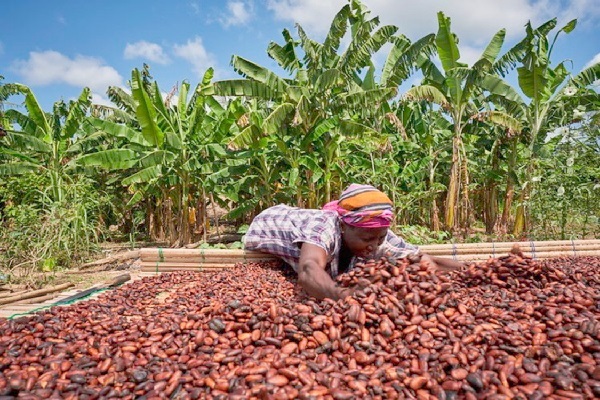Ghana's cocoa production is expected to rebound in the 2024/25 crop season, buoyed by favourable weather conditions, according to local farmers, officials from regulatory body Cocobod, and buyers.
However, challenges such as illegal gold mining, smuggling, and disease continue to pose risks.
In June, the world's second-largest cocoa producer saw its output fall below 55% of its average seasonal output, marking a more than two-decade low.
Similar problems in neighbouring Ivory Coast, the world's leading cocoa producer, have resulted in a four-year global cocoa market supply deficit, pushing the prices of chocolate's key ingredient to record highs.
Ghana now expects output to recover to 650,000 tons in the 2024/25 season, though an official of the International Cocoa Organization said they see it around 500,000 tons.
Over 20 cocoa farmers, Cocobod officials, and local buyers told Reuters that farms are showing healthier pods than the previous season due to improved rainfall and sunshine, as well as the timely use of fertilizers and pesticides.
Abdul-Majid Mumuni, head of Cocobod's cocoa health and extension division in Ghana’s southeastern region, said, "The crop is amazing; the trees are productive and you can count not less than 50 pods per tree."
A secretary of a farmers group in Ghana's southeastern Asamankese district, Ocran Christopher, said they've harvested 500 bags since this season opened in Sept. from their over 72-hectare farm compared with about 820 bags in the entire 2023/24 season.
"If things remain like this, we can harvest 2,000-2,500 bags," he said.
Cocobod officials said they've seen increased cocoa deliveries this season but are cautious as the season was young.
Despite this positive outlook, farmers expressed concern about the potential outbreak of black pod disease and continuing bean smuggling. Ghana lost more than a third of its 2023/24 cocoa output to smuggling, according to Cocobod officials.
In response, the regulator has increased the farmgate price by nearly 45% for the current season and replaced the long-standing cocoa loan syndication system with a new funding model, requiring global traders to pay upfront for part of the cocoa bean shipments.
Although the new model aims to deter bean trafficking, it received mixed reviews from farmers and buyers. A district manager at a licensed cocoa buyer in Ghana said the new model's limited funds could potentially slow purchases and encourage smuggling.
Latest Stories
-
Reset global sugar standards: A 20% cut can save lives and billions
1 hour -
NACOC destroys over GH¢12.6m of illicit drugs at Bundase
1 hour -
1st Pan African AI Summit to take place from September 23-24 in Accra
2 hours -
NPP race: Bawumia leads in key regions – Global Info Analytics
2 hours -
GJA affirms MGL’s Kofi Adu Domfeh as Ashanti Regional GJA Chairman-elect
2 hours -
Blackstar Experience partners AfCFTA, ATP to host Creatives Connect Afrika in November
3 hours -
Ridge Hospital nurse sues social media activist Ralph Saint Williams for GH₵7m over assault and defamation
3 hours -
Police refute reports of dismissal of officer involved in Ablekuma North by-election incident
3 hours -
FBI commends Cyber Security Authority of Ghana in $100 million fraud case
5 hours -
Sekondi: Man arrested as murder suspect in 17-year-old brother’s stabbing incident
5 hours -
JoySports Invitational Tournament 2025 preview: Chief of Staff joins corporate Ghana for event on August 23
5 hours -
Bagre Dam to start spilling on August 27
6 hours -
University of Ghana opens 10-day exhibition showcasing nation’s heritage and identity
6 hours -
Choose physical exercise to boost your energy instead of substance abuse – Okomfour Kwadee
6 hours -
Berlinale Spotlight: Accra returns with African cinema and critical conversations
6 hours

